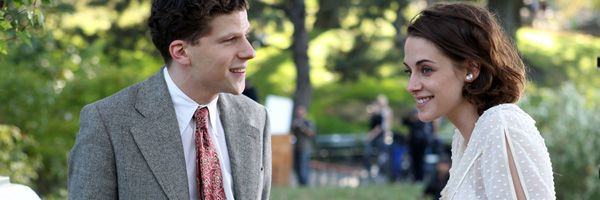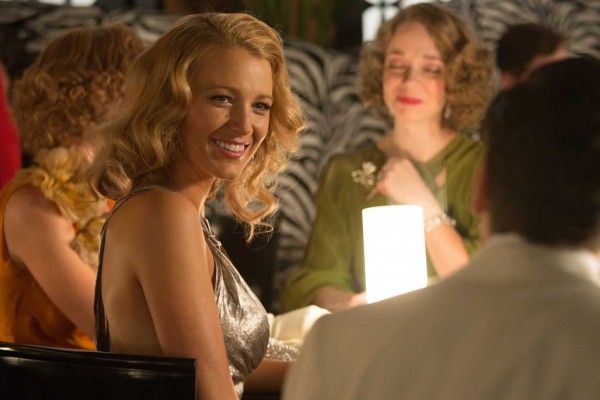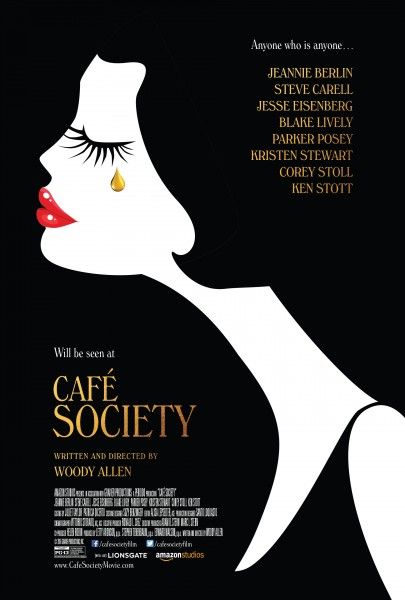Woody Allen is a veteran of Cannes openings. After Hollywood Ending and Midnight in Paris, he opened the 69th edition of the world's biggest film festival with his brand of coffee, sometimes sweet, often bittersweet, but always oddly familiar. Café Society is entertaining and contains all the ingredients we love in Woody Allen films - so do we really care if it's always stirred the same way and never shaken?
It had been a while since Woody Allen hadn't shown his open disdain for Hollywood, a "boring, nasty, dog-eat-dog" industry, as one of his characters says in the movie. (However, Blake Lively said at the press conference in Cannes that "it's more the media who's making it dog-eat-dog." Not entirely false, but that's another movie.) But still active at his age - "I'm 80, I can't believe it" - he still has a few stories to tell, some Jewish jokes to share, a few ghosts of the past to revisit, all swathed in Vittorio Storaro's exquisite cinematography where the lights invite us into the 1930s, when the movie is set.
Jesse Eisenberg is transformed into a young Allen in the lead role. The way he talks, his wavy hairdo, his high-waisted side pants and even his posture are modeled after Woody himself. He excels in his role as the sweet Bobby Dorfman, a Jewish kid from the Bronx who quits his dad's business and moves to Los Angeles hoping to get hired by his uncle Phil (Steve Carell), a powerful Hollywood agent in high demand. Phil ("stop calling me uncle, you don't want to make the nepotism look too obvious") is elusive at first, but the man is not avoiding him, he really is that busy. Two weeks later, he manages to find five (interrupted) minutes to see his nephew and gives him a job as errand boy. And it only goes uphill to the Hollywood Hills from there. Phil is soon inviting Bobby to parties - nothing wild, just luncheons around the pool - and introducing him to the right people.
Part of Café Society's panache is the promise of a romance between Jesse Eisenberg's Bobby and his co-star Kristen Stewart's Vonnie.
Phil's young secretary, Vonnie is a former ingenue "disillusioned" with the industry. She is a down-to-earth gal, her head well beneath the stars, now that they are no longer in her eyes. You see, she left her native Nebraska her eyes full of them hoping to become one herself. She, too, dreamt of over-the-top Beverly Hills mansions with swimming pools, but now, she tells Bobby as she takes him on a tour of homes of the stars, she'd be "happier being life-size" and living near the beach. Stewart is natural in her role, the exact opposite of a young girl you'd expect to see in Hollywood. Her costumes, designed by Suzy Benzinger, are noteworthy as well as they depict a carefree willowy young woman, and a fashion that seems 2016 at the same time.
The young man falls for her, but she already has a boyfriend - a journalist named Doug, she tells him. But we quickly find out it's none other than Uncle Phil, who promises to leave his wife of 25 years - even though she's a "lovely woman" and the sex is great - and marry his younger mistress. How very Tinseltown. Or Allen's Manhattan, whose adulterous love-triangle inevitably comes to mind. After he backs down, Vonnie strikes a romance with Bobby, until Phil returns. But Café Society doesn't elicit us to take sides. We feel empathy for the cheating husband because he seems so much in love; Vonnie because she's torn between two men; Bobby because he's a nice boy about to have his heart broken.
Bobby returns to New York and works in the nightclub owned by his gangsta brotha, Ben, played by Corey Stoll (who was Hemingway in Midnight in Paris) - a strain for his family and society. The club is the place to be of the art deco Café Society, New York City's high life. Anyone who's someone is there. And Bobby is now a someone. Yet this transition lacks punch. He is a man of the world, nabs a gorgeous wife, Veronica (Blake Lively), yet still carries that naïveté - he still has that "deer in the headlights" quality that Vonnie told him he had when they first met. Heartbreak usually transforms people and opens their eyes, but he is still pining for his former flame. "Has anyone called you Vonnie?" He even asks his wife. The character has not grown since his days in Tinseltown and we are left pining for a stronger personality... And sometimes story.
Rating: B-



